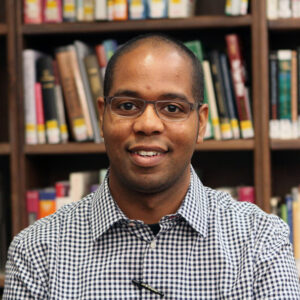Where did you grow up?
I was born in Detroit and raised in Hampton, VA.
Where did you go to school for your undergraduate and graduate degrees?
I attended Morehouse College in Atlanta, GA where I earned my BA in Psychology. I earned my MA in Psychology and later my PhD in Clinical-Community Psychology from the University of South Carolina in Columbia, SC.
What or who influenced you to study psychology?
I cannot say that any one thing or person influenced me to choose this field. My mother is a life-long learner who values education and stressed the importance of accomplishment to anyone that would listen. My father and his mother served the mental health needs of Southeastern Michigan for their entire careers. When I got to Morehouse, I was initially going to pursue English as a major, but before my first day of classes, I switched to psychology on a whim.
What led you to teach at MSP?
I like the idea of being able to give back to my birth state by sharing what I have learned since I been gone! MSP seems like a great place to fulfill that goal.
What’s your favorite part of teaching?
Learning from my students. They have a wealth of academic and life experiences that I have found really enrich the teaching experience. Teaching is a great way to blend personal passions like pop culture with professional experiences to give a one-of-a-kind experience.
What are your research and/or clinical interests? What are you most passionate about in your professional life?
My research topics have included the intersection of depression, religiosity, and spirituality among Black American college students, socio-cultural differences in coping from traumatic stress as a result of Hurricane Katrina, and the impact of school-based interventions on the educational resilience of at-risk youth. I have also dabbled in forensic research topics such as false confessions and perceptions of sexually violent predators. Clinically, I enjoy working with clients living with personality disorders, eating disorders, and youth of color with challenging circumstances. Recently I have developed interests in the intersection between public policy and psychology, and I would eventually like to pursue a career in media psychology.
What is your favorite non-academic book and why?
Can I have two, please? My first is Makes Me Wanna Holler by Nathan McCall. This is a coming-of-age narrative of a Black man who grew up in Southeastern Virginia back in the 70s who made some bad decisions. He eventually hit rock bottom (prison) only to rise from the ashes and become a nationally-renowned journalist. And most of it happened down the street from where I grew up!
The second book is It by Stephen King. I love a good horror story – something about extremes in behavior has always appealed to me – but the villain in this story really takes the cake. I also really appreciate how close the friends featured in the book were – years passed and they picked up right where they left off. Those are the kinds of friendships I find most fulfilling – and the power of their friendship was the best part of the story.
What would people be surprised to learn about you?
I really hate to drive on bridges. I mean, I will, but if you are riding with me, please be still and quiet, and no, we are not listening to music until we are safely on the ground again.
What sage advice would you like to share with students?
The most important thing a therapist can have is an understanding of pain. As long as you know how to empathize with the client’s pain without bringing yours into the room, you will always be able to give the client something.